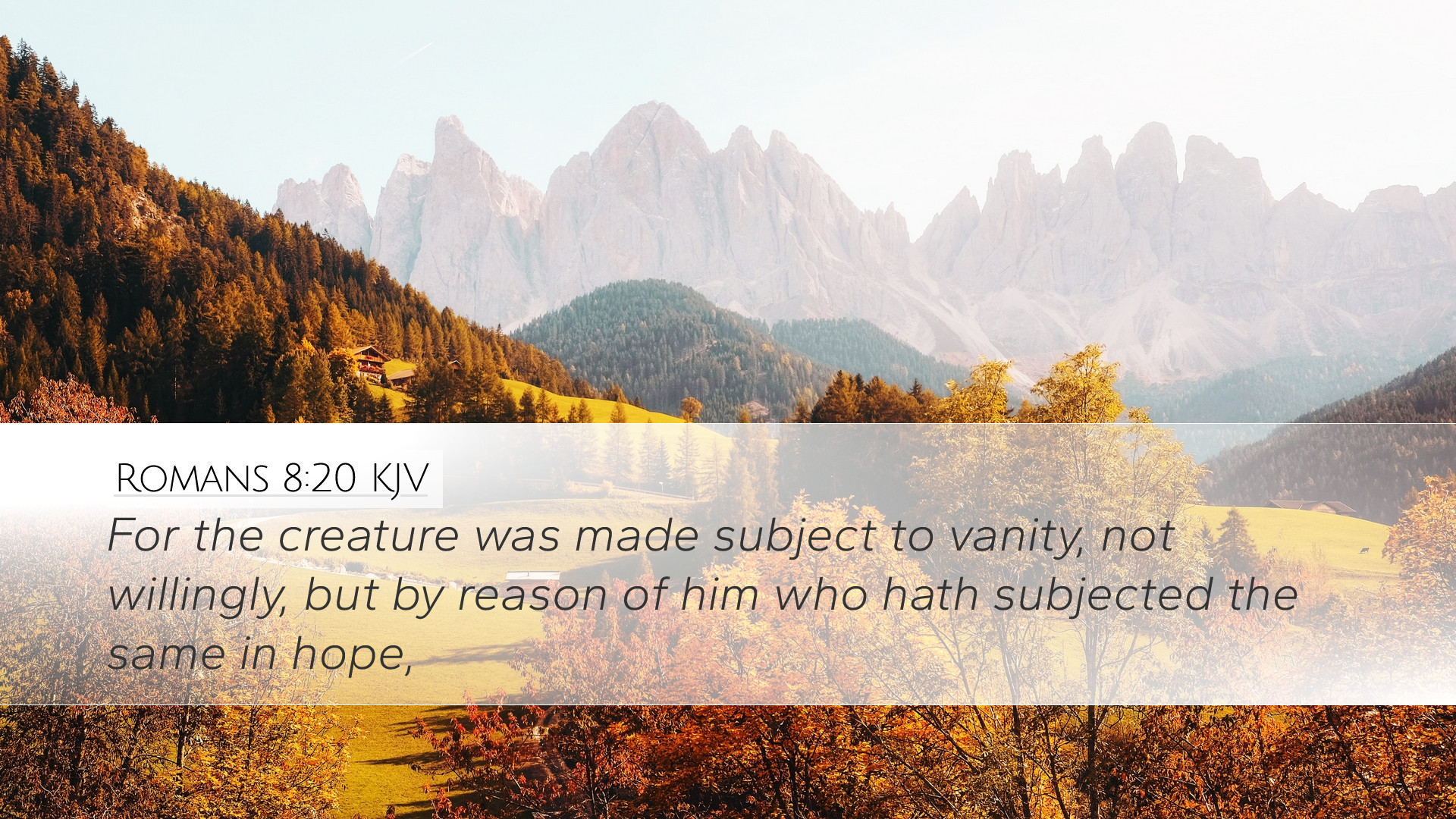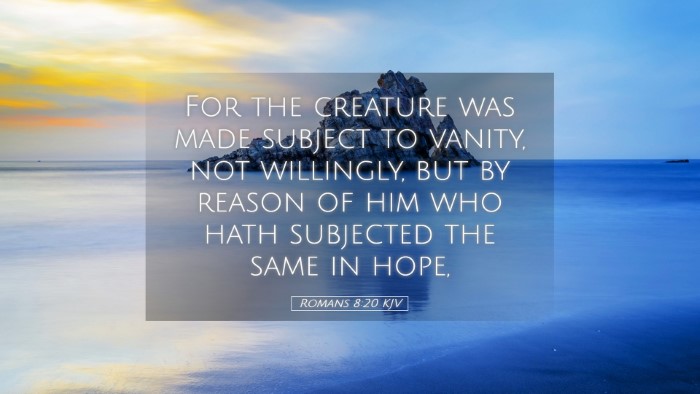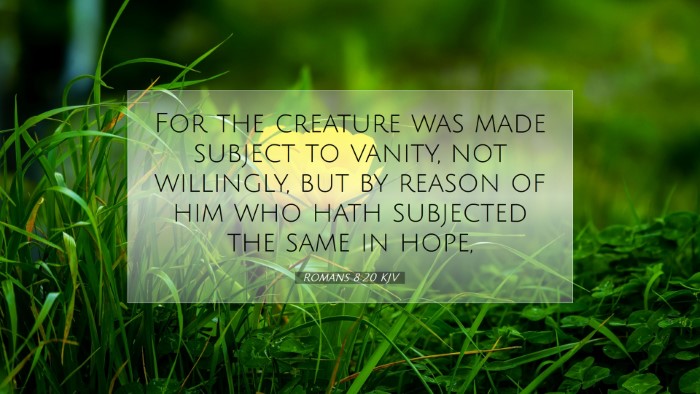Commentary on Romans 8:20
"For the creature was made subject to vanity, not willingly, but by reason of him who hath subjected the same in hope." (Romans 8:20)
Introduction
The verse Romans 8:20 dives into the profound theological themes of creation, the fall, and the hope of redemption. This part of Paul’s letter to the Romans emphasizes the connection between humanity’s sin and the state of the natural world. The implications of this verse speak not only to the suffering present in creation but also to the anticipation of glorious freedom that awaits both mankind and the entirety of creation.
Exposition
To understand Romans 8:20, we must consider the context within Paul’s argument. The apostle establishes that all of creation was subjected to vanity and futility, reflecting the fallenness of the world due to humanity's sin. This commentary will draw insights from various public domain scholars.
Matthew Henry’s Insights
Matthew Henry emphasizes that the "creature" refers to all of creation, not just humankind. He posits that this subjection to vanity occurred not out of choice, but as part of God’s sovereign plan. According to Henry, this can be understood in two dimensions:
- The Condition of Creation: Creation itself is in a state of decay and frustration as a result of sin entering the world. This has caused a disconnection between creation and its intended glory.
- The Hope of Redemption: Even though creation has been subjected to this vanity, it is done in the hope of eventual deliverance and restoration through Christ. Henry underlines that this hope is fundamental to the Christian faith.
Albert Barnes’ Perspective
Albert Barnes provides a thorough theological exposition, suggesting that "subject to vanity" refers to the moral and physical corruption that affects the universe. He delineates the following key ideas:
- Involuntary Subjection: Barnes highlights that creatures did not willingly fall into this condition; rather, they were subjected by God’s decree post-fall. This underscores the idea of divine sovereignty.
- The Role of Hope: He illustrates that this hope is not mere wishful thinking but is grounded in God's promises. Creation awaits a glorious redemption, anticipating the day when all things will be made new.
- Parallels with Humanity's Struggle: Barnes connects the plight of creation with the struggles that believers face, indicating that just as believers endure present sufferings, creation too eagerly anticipates its liberation.
Adam Clarke’s Analysis
Adam Clarke's commentary offers a rich exegetical perspective on the implications of this verse in light of hope and suffering:
- The Nature of Vanity: Clarke interprets "vanity" (or "futility") as a state that reflects the incompleteness and turmoil within creation. It is indicative of the larger cosmic struggle resulting from sin.
- Divine Purpose: Clarke affirms that everything in creation has been subjected according to God’s purpose; thus, it is not without meaning or intention but designed to culminate in hope.
- Transformation Through the Gospel: He highlights the gospel's transformative power, assuring believers that through Christ, creation’s sorrow is not the final chapter. Clarke expresses that the anticipation of a new heaven and earth provides profound comfort and motivation to persevere.
Theological Implications
Romans 8:20 serves as a reminder of the reality of sin's effects but, more importantly, conveys a message of hope and assurance. The theological implications of this verse call attention to:
- The Sovereignty of God: It reinforces the belief in God’s ultimate control over creation, reminding scholars and students that God’s purposes encompass all of history, including its trials.
- The Interconnectedness of Creation: It invites deeper reflection on the relationship between humanity and creation, urging a stewardship ethic that recognizes the suffering of the whole world as intimately tied to human actions.
- The Future Glory: The text encourages believers to look forward to the eschatological hope that promises restoration and renewal. This is not merely a future event but a present hope that shapes ethical behavior and engagement with the world.
Practical Applications
For pastors, students, and theologians, the insights gained from Romans 8:20 can be applied in various ministries and contexts:
- Pastoral Care: Understanding the suffering and frustration of creation can lead to more empathetic and effective pastoral care for those struggling with environmental issues or suffering.
- Environmental Stewardship: The call to recognize creation's plight fosters a theology that encourages responsible stewardship of the earth, advocating for its care as a reflection of God's character.
- Hope in Preaching: This verse provides a foundation for preaching hope amidst despair, heralding the message that suffering in this world is temporary and will lead to something glorious.
Conclusion
Romans 8:20 encapsulates the deep tension between the reality of suffering in creation and the hope of future glorification. The insights from Matthew Henry, Albert Barnes, and Adam Clarke provide a rich tapestry of understanding that allows pastors, students, and theologians to grasp the significance of this verse within the broader narrative of Scripture. May this understanding inspire faithful witness and a steadfast hope in Christ, as we await the redemption of both creation and ourselves.


